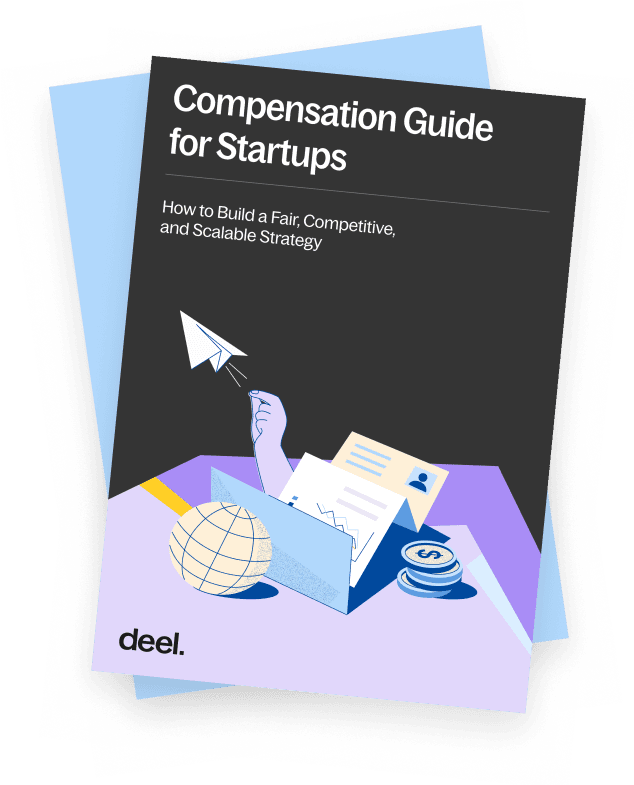Article
3 min read
Stock Option Basics for Startup Employees
Legal & compliance

Author
Owen Yin
Last Update
June 20, 2025

Table of Contents
Share (aka stock)
Option
Grants
Understanding the offer letter
Grant date
Vesting period
Vesting date
Accelerated vesting
Cliff
Exercise
Exercising date
Exercise price
Fair market value (FMV)
In the Money (ITM)
Outside the Money (OTM)
Expiration Date
Capital Gain
Ordinary Income
Liquidity event
Initial public offering (IPO)
Offer competitive local pay with salary insights
Types of equity compensation
Employee Stock Option Plan (ESOP)
Restricted Shares Unit (RSU)
Incentive Stock Options (ISO)
Non-Qualified Stock Options (NSO)
Track equity agreements with Deel
Many startups offer stock options as part of a compensation package. Understanding your stock options letter requires learning some new terms and concepts. Here’s a glossary of common terms to help you decipher these wordy legal documents.
Share (aka stock)
A share is a legal security that entitles its holder with a fractional ownership right of the company that issued it. Shares and stocks are interchangeable terms. Generally, a shareholder can participate in the company’s shareholders’ meeting, but the company can issue shares with different rights and permissions. Equity grants usually offer common shares.
Option
An option is a benefit that gives the owner the right to buy a set of a company’s shares at an agreed price (exercise price) under specific conditions such as continued employment or reaching certain milestones.
Grants
Grants are a legal document that provides the right to acquire a set number of shares at a fixed price according to a specific schedule. If the set price is lower than the share price, that means you’re buying shares at a discount. Grants are also called stock option agreements or stock option plans.
The agreement will outline important details, such as the grant date, the exercise price, any applicable restricted terms, and vesting period.
Understanding the offer letter
Grant date
A company grants stock options on a specific date called the grant date. This date usually sets the schedule for your vesting period.
Vesting period
The vesting period is the length of time a person with a stock option must wait before exercising their stock option right. The vesting period is usually between two to four years.
Vesting date
When the vesting period expires, the stocks become ready for exercising—this is called the vesting date.
Accelerated vesting
Accelerated vesting is a strategy some companies may include that lets you vest at a faster pace if the company triggers certain events. For example, if it gets acquired partway through your four-year vesting period, you immediately vest your remaining options.
Cliff
A cliff is a time-based delay on the first part of a grant. Most companies use a 1-year cliff based on your start date, which means that you must wait until your first anniversary at the company before you have options to exercise. Once you pass the cliff, you will usually get more options on a quarterly or monthly basis. You do not receive any options if you leave the company before passing the cliff date.
Exercise
Exercising an option means exercising (making use of) your right to obtain stock. When you exercise your options, you convert them into company stock. Exercising does not mean selling the option.
Exercising date
The date when you exercise your stock options is the exercise date.
Exercise price
The exercise price, or strike price, is the amount you will pay to exercise the option. This price is set on the stock option plan agreement. The strike price is usually set according to the fair market value of the stock at the time of the initial grant.
Fair market value (FMV)
The fair market value of a share is the price the market currently accepts. For public companies, the price is whatever amount the stock is currently trading at on the stock market. For private companies, an independent third party determines the price by providing an appraisal called the 409A valuation.
In the Money (ITM)
A scenario you might describe as “in the money” is when the company’s share price is worth more than the exercise price in your option agreement. If you exercise your option at the set exercise price and then immediately sell them at market price, you’d be left with a profit (in the money).
For example, let’s say you hold 1,000 options with an exercise price of $10. The company goes public on the stock market, and its share price is $50. If you exercise your 1,000 options, you’ll pay $10,000 for 1,000 shares. You can then sell them for $50,000, earning $40 per share for a total profit (spread) of $40,000. In real life, this scenario becomes more complicated when you factor in tax.
Outside the Money (OTM)
A scenario you might describe as “outside the money” is when the company’s share price is worth less than the exercise price in your option agreement. If you exercise your option at the set exercise price and then immediately sell them, you’d lose money.
We’re not providing financial advice, but it probably doesn’t make sense to exercise your stock option rights if you would be left OTM.
Expiration Date
You are not required to exercise your options as soon as you’ve reached your vesting date. You can hold on to them and exercise them anytime up to the expiration date. Past the expiration date, the option expires.
Capital Gain
A capital gain event occurs when an asset such as an option or share is sold for a profit. The profit made is called the capital gain and it is generally taxed at a lower tax rate than ordinary income.
In the US, capital gains are further categorized into short-term and long-term capital gains, depending on how long you held the asset before you sold it.
Ordinary Income
Ordinary income refers to income that comes from a salary or wage. It’s usually taxed at a marginal tax rate under a progressive tax system, with higher tax rates than the capital gains tax rate.
Liquidity event
A liquidity event occurs when shares find a market with interested buyers, allowing shareholders to sell shares for cash. Most commonly, private shareholders look for an IPO or sale of the company.
Initial public offering (IPO)
An IPO is when a private company “goes public” by offering shares to the public market. An IPO is a major liquidity event for existing shareholders because there’s new demand from public investors.

Guide
Build a compensation strategy that scales with your startup
Offer competitive local pay with salary insights
Not sure what a fair, attractive salary looks like across the globe? Get salary recommendations based on real-time market rates for your new hire's role and region.
Types of equity compensation
Companies can offer equity in many different ways. As a general rule, you will pay tax on any profit you make from equity compensation. For more, consult our employer guide to employee equity grants.
Employee Stock Option Plan (ESOP)
The ESOP is the guiding document that the company uses to carry out its stock option program. It outlines high-level details of the stock program, such as how many shares are reserved for granting and who is eligible to receive a grant.
Restricted Shares Unit (RSU)
A company might grant you shares called RSUs instead of options. RSUs are granted under similar terms as options, usually with vesting schedules and cliffs. Unlike options, RSUs do not have any exercise price.
Incentive Stock Options (ISO)
Incentive Stock Options are a form of stock option grant you can only offer to employees. ISOs meet specific IRS criteria, so they may qualify for a lower tax rate under US tax law when exercised. If you don’t live in the US though, you generally can’t qualify for this tax benefit.
Non-Qualified Stock Options (NSO)
Non-Qualified Stock Options are a form of stock option grant you can grant to employees, vendors, suppliers, and contactors. These options do not meet the conditions of US tax law to be considered ISOs, so they’re called “non-qualified”. If you exercise an NSO, you’ll pay regular income taxes on your capital gain (the difference between the market price and the strike price).
Track equity agreements with Deel
Thousands of companies use Deel’s payroll and compliance platform to manage their global employees and contractors. And with Deel’s comprehensive onboarding process, companies can offer and track stock grants right from the Deel platform.
If you’re interested in offering equity grants to remote employees or contractors, learn more about Deel's equity solutions or schedule a demo with a Deel expert today to see how it’s done.
Disclaimer: This article is provided for general informational purposes and should not be treated as legal or tax advice. Consult a professional before proceeding.
Deel Equity

Owen Yin is a content communicator specializing in decoding complex topics into an insightful language anyone can understand. Owen covers compliance, tax, and payroll topics, offering readers verifiable research that eliminates confusion and enables action. Owen’s work has been cited in Forbes, The Verge, CNN, Mashable, The Washington Post, and others.















